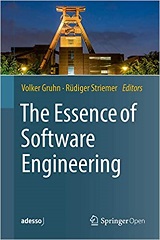
|
FreeComputerBooks.com
Links to Free Computer, Mathematics, Technical Books all over the World
|
|
- Title: The Essence of Software Engineering
- Author(s) Volker Gruhn, Rudiger Striemer
- Publisher: Springer; (January 23, 2019); eBook (Creative Commons Licensed)
- License(s): Creative Commons License (CC)
- Hardcover/Paperback: 251 pages
- eBook: PDF (247 pages)
- Language: English
- ISBN-10: 3030088804
- ISBN-13: 978-3030088804
- Share This:

|
This open access book includes contributions by leading researchers and industry thought leaders on various topics related to the essence of software engineering and their application in industrial projects. It offers a broad overview of research findings dealing with current practical software engineering issues and also pointers to potential future developments.
It offers readers a concise overview of the essence of software engineering, providing valuable insights into the latest methodological research findings and adesso's experience applying these results in real-world projects.
About the Authors- Prof. Dr. Volker Gruhn holds the Chair for Software Engineering at the University of Duisburg-Essen. His research focus is on methods for industrial software engineering, as well as the effects of digital transformation on enterprises. He co-founded adesso AG in 1997 and is chairman of the supervisory board today.
- Dr. Rudiger Striemer was a member of the executive board of adesso AG from 2001 to 2015, and is today responsible for the software development at adesso's national companies in Switzerland, Austria and Turkey.
- Software Engineering Principles and Practices
- Management, Project Management, and Risk Management
- Free and Open Source Software (FOSS)
 Similar Books:
Similar Books:
-
 Managed Software Evolution (Ralf Reussner, et al)
Managed Software Evolution (Ralf Reussner, et al)
Instead of separating the development, adaptation and evolution of software and its platforms, as well as aspects like operation, monitoring and maintenance, they should all be integrated into one overarching process.
-
 Rethinking Productivity in Software
Engineering (C. Sadowski, ...)
Rethinking Productivity in Software
Engineering (C. Sadowski, ...)
This book covers definitions and core concepts related to productivity, guidelines for measuring productivity in specific contexts, best practices and pitfalls, and theories and open questions on productivity.
-
 Software Foundations (Benjamin C. Pierce, et al)
Software Foundations (Benjamin C. Pierce, et al)
This book shows you how computer programming works without all the technical details or hard programming language. It explores the common parts of every computer programming language and how to write for multiple platforms.
-
 Test-Driven Development: Extensive Tutorial
(G. Galezowski)
Test-Driven Development: Extensive Tutorial
(G. Galezowski)
If you're looking for a practical resource on Test-Driven Development this is the book for you. You've found a practical end-to-end guide that will help you implement Test-Driven Techniques for your software development projects.
-
 The Future of Software Quality Assurance (Stephan Goericke)
The Future of Software Quality Assurance (Stephan Goericke)
This open access book Highlights the state of the art in software testing, as well as future challenges and trends, covers current and emerging technologies like test automation, DevOps, and artificial intelligence methodologies used for software testing.
-
 Real-World Maintainable Software (Abraham Marin-Perez)
Real-World Maintainable Software (Abraham Marin-Perez)
With this practical book, you'll learn 10 easy-to-follow guidelines for delivering Java software that’s easy to maintain and adapt. These guidelines have been derived from analyzing hundreds of real-world systems.
-
 Software
Design for Flexibility (Chris Hanson, et al.)
Software
Design for Flexibility (Chris Hanson, et al.)
This book describes techniques they have found effective--over their combined 100-plus years of programming experience--that will help programmers avoid programming themselves into corners.
-
 Scaling a Software Business: The
Digitalization Journey
Scaling a Software Business: The
Digitalization Journey
Software has changed the rules of the game. The world talks about the digitalization in industry and society - how the focus has shifted from producing tangible things towards software and services.
-
 The New Software Engineering (Sue Conger)
The New Software Engineering (Sue Conger)
This book discusses the software engineer's project related knowledge and theoretical background in order to facilitate and speed the process by which novices become experts. It covers project planning, project life cycles, methodologies, technologies, etc.
-
 Domain-Driven Design Quickly (Abel Avram, et al)
Domain-Driven Design Quickly (Abel Avram, et al)
This book is a short, quickly-readable summary and introduction to the fundamentals of Domain Driven Design (DDD), it does not introduce any new concepts; it attempts to concisely summarize the essence of what DDD is, drawing mostly the original book.
|
:
|
|
 |
|
 |
|
 |
|
 |
|
 |
|
 |
|
 |
|
 |
|
 |
|
 |
|
 |
|
 |
|
 |
|
 |
|
 |
|
 |
|
 |
|



